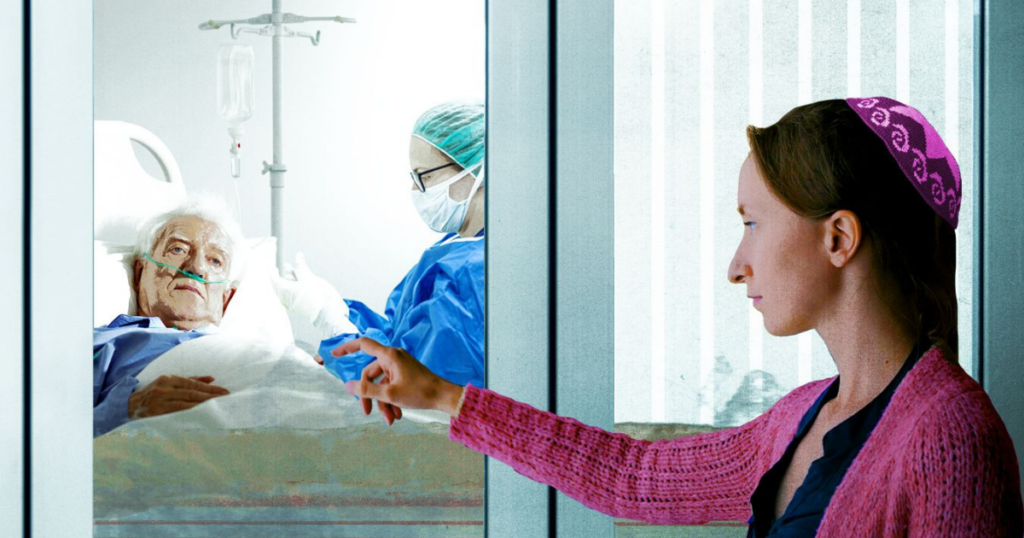Being Jewish
Commentary
Lessons From the Pandemic on Caring for the Sick and Dying

As the pandemic becomes part of our past, there will be, in Rabbi Shira Stern’s apt words, “Covid keepers,” invaluable lessons we will treasure. I am a chaplain. My experiences of illness and suffering during Covid-19 were not only professional but also personal. What I and other chaplains have learned in this extraordinarily challenging time will change forever the way we companion the sick and dying—for the better.
In the middle of the pandemic, my husband, David, developed frightening symptoms from a chronic illness unrelated to the coronavirus. I had to drop him at the emergency room like a sack of laundry and couldn’t be with him. Days went by. Staff were scarce and overwhelmed. David’s symptoms and panic got worse. I awakened one morning at 6 a.m. to a series of desperate texts: “Can’t breathe.” “Can’t swallow.” “Choking.” “Get help!”
I video chatted with David for hours, reassuring him, communicating his needs to the hospital staff when he couldn’t. Eventually, a physician appeared at his bedside and prescribed the right combination of medicines to control his symptoms. When David was finally released after 11 long days, I was traumatized, exhausted by fear and frustration. David was weakened, but uplifted.
During his hospitalization, David received daily visits from John, the hospital chaplain. This malach (angel) risked his life to serve in a place of contagion. John spoke little, but listened deeply and generously. He invited David to pray and allowed him to cry his heart out.
Those of us who care for the spirits of people facing illness and death practice what I have named livui ruchani. The term livui means to accompany; its root is used in the Hebrew word for funeral, levaya, and for companion, melaveh. Ruchani means spiritual.
Simply being present is the heart of livui ruchani. Chaplains show the person that they are not alone. We represent their connections—to family, to their people, to the One the psalmist calls Ha-Rofeh L’Shvurei Lev, the Healer of Broken Hearts (Psalm 147:3). Through compassionate listening, we allow them to give voice to their deepest hopes and fears.
But how can we be present when we cannot get near the suffering individual?
The exigencies of the pandemic forced spiritual caregivers—and family members, too—to be resourceful and resilient in accompanying the ill and dying. We learned to use technology to make connections, to take risks for the sake of holy work and to rethink what it means to be present.
Rabbi Mychal Springer is a chaplaincy educator who worked at the epicenter of Covid in New York City. When the wife of a severely sick man begged her for help, she was determined to act. She printed out pictures and prayers his wife sent and asked the nurses to hang them in his line of vision. The nurses “facilitated a [daily] video call, so that the husband could hear his wife’s voice and see his family. I prayed outside the glass every day; the staff joined me in upholding this man and his family. And he lived,” she wrote in an essay in Jewish End-of-Life Care in a Virtual Age: Our Traditions Reimagined.
Springer discovered that reciting the Mi Shebeirach healing prayer outside the room did not prevent her presence from being felt. She affirmed the man’s humanity, embodied hope and offered comfort to his terrified wife, all from a distance. Her pandemic patients died more often than they lived, but they were not alone.
Here are some other Covid-keeper lessons: Author E.M. Forster’s imperative, “only connect,” is our best guidance. Though often unrecognized, the work of chaplains is profound and transformative and should not be taken for granted. And, when geographical distance or jobs or children make it impossible to be physically present, family members can and will use technology, ingenuity and love to be there. Our virtual presence will bring caring, prayers, love and refuah shlemah—healing that brings wholeness.
Rabbi Dayle Friedman is a chaplain, spiritual guide and scholar who is currently serving as interim rabbi of Congregation Bet Haverim in Atlanta. She edited Jewish Pastoral Care: A Practical Handbook from Traditional and Contemporary Sources; and co-edited, with David Levin and Simcha Paull Raphael, Jewish End-of-Life Care in a Virtual Age: Our Traditions Reimagined.









 Facebook
Facebook Instagram
Instagram Twitter
Twitter
Leave a Reply